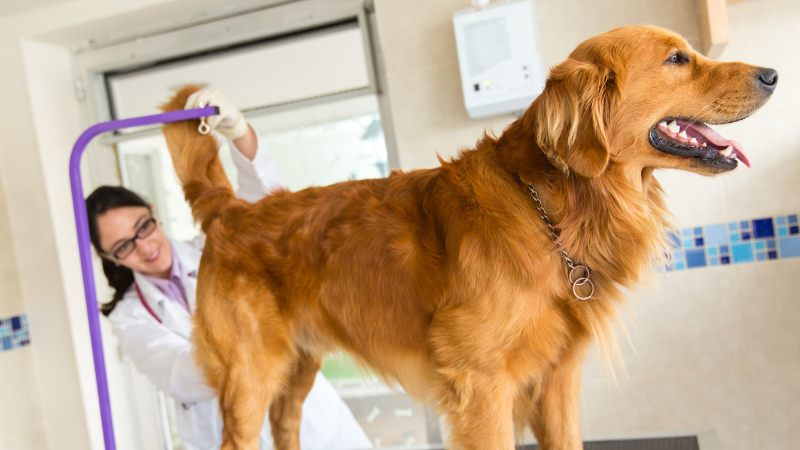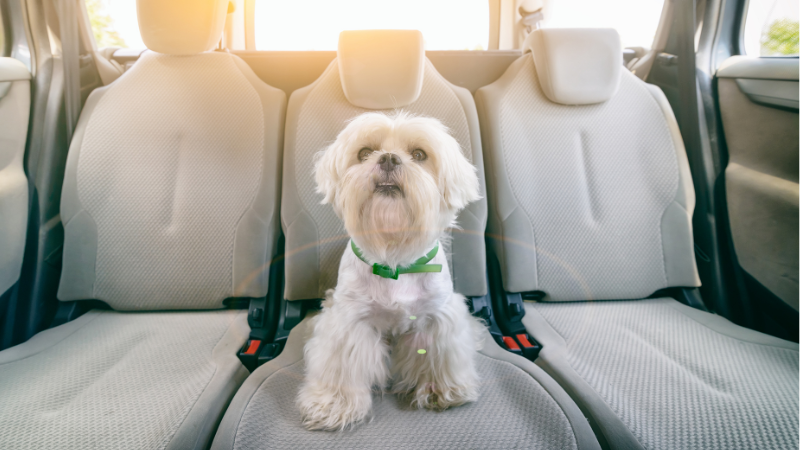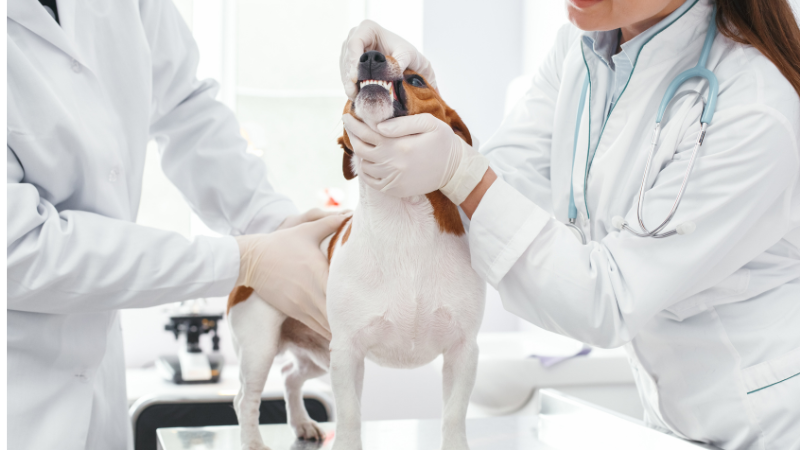Do Dogs Get Hemorrhoids? (A Simple Answer)

Dogs are popular pets worldwide. They are trustworthy, warm-hearted, and possess a wonderful sense of humor. On the other hand, just like humans, dogs are susceptible to various health problems. People frequently suffer from hemorrhoids, but many pet parents are curious about whether or not their pets might also have this condition.
The answer to this question is “No,” technically, a dog’s bum can not suffer from hemorrhoids because the anatomy of their gastrointestinal system is different from humans. The lower gastrointestinal tract is more vertically oriented in humans, increasing our risk of developing hemorrhoid issues.
On the other hand, the lower gastrointestinal tract of dogs is more horizontally oriented, which puts less strain on the blood vessels in the dog’s rectum itself. So, when we are saying hemorrhoids in dogs, we focus on inflamed or diseased dog anal glands or surrounding vessels.
Here you can study the complete case report of a police k9 dog having hemorrhoids or anal sacs problems.

What are Hemorrhoids?
Hemorrhoids are enlarged veins in the rectal or anal region that can be painful, itchy, and sometimes bleed. They can manifest themselves either internally or externally. While humans can get hemorrhoids easily, the definition of dog hemorrhoid is somewhat different.
In dogs, hemorrhoids can only occur when there are partial or full prolapse or anal tumors in the dog’s anal region. But, sometimes, anal gland inflammation is also referred to as hemorrhoids or rear-end issues in dogs.

Signs of Dog Hemorrhoids or Rear End Issues
The symptoms of inflamed anal glands or hemorrhoids in dogs are very similar to the symptoms that humans experience. They are as follows:
- Bloody Stool
- Trouble defecating due to swollen anal gland problem
- Experiencing pain or discomfort in the anal area
- Prolapsed rectum
- Swelling or inflammation in the rectal region, i.e., swollen blood vessel
- Itching or discomfort around the anus
- Licking or scratching the genital region
It is essential to take your dog to a qualified veterinary professional to receive an accurate diagnosis and appropriate treatment if it displays any of these symptoms.

Causes of Dog Hemorrhoids
Although the origins of hemorrhoids or inflamed anal glands in dogs are not completely known, it is thought that they are comparable to the factors that lead to the condition in people. Some possible reasons include the following:
- Persistent chronic constipation or diarrhea
- Straining during bowel motions
- Rectal prolapse
- Anal gland problems
- Age-related alterations in the body
- Obesity and/or leading a sedentary lifestyle
- Hemorrhoids can be caused by genetics or a family history of the condition
- Due to diseases of the digestive tract, such as inflammatory bowel disease and others

Treatment of Dog Hemorrhoids
The severity of the dog’s anal glands will determine which treatment options are available for dog hemorrhoids. Treatment for mild anal gland problems might consist of very simple steps like the following:
- Encouraging your dog to consume plenty of water to soften stool
- Raising the amount of fiber in a dog’s diet in order to encourage more consistent bowel movements
- Applying a warm compress to the affected area to bring down the localized swelling
- Maintaining a clean and dry environment in the anal region
- In more serious cases, your veterinarian may suggest the following:
- Prescribed drug to treat, decrease inflammation or alleviate discomfort
- Hemorrhoidectomy, surgery, or the surgical removal of the hemorrhoid
- Alterations to the pup’s diet or physical activity level to prevent future episodes of hemorrhoids.
You can visit here for more advanced hemorrhoid treatment in dogs.

Conditions That Resemble Dog Hemorrhoids/Anal Gland Issues
Several conditions can resemble hemorrhoids or anal gland issues in dogs, including:
Perianal Fistulas
Inflammatory and persistent perianal fistulas are cutaneous disorders that can affect the area around the anus. They can induce symptoms that are similar to those of hemorrhoids, such as the following:
- Biting or licking the rectal region
- Swelling or inflammation around the anus
- Pain or discomfort during bowel movements
- A discharge or blood coming from the dog’s anus.

Colorectal Cancer
Colorectal cancer is a dangerous disorder that can potentially be life-threatening and induce symptoms comparable to hemorrhoids. These symptoms consist of the following:
- Blood in the stool
- Variation in bowel motions
- Discomfort or pain in the region of the rectal organs
- Weight loss or loss of appetite
Although these disorders might look similar to hemorrhoids, their treatment, and management are quite different. If you have any reason to believe that your dog is exhibiting any of these signs, you must take them to a veterinarian as soon as possible so that they can provide an appropriate diagnosis and treatment plan.

Similarities and Differences of Hemorrhoids in Dogs and Humans?
There are numerous similarities between the symptoms, root causes, and medical approaches to treating hemorrhoids in people and dogs. On the other hand, there are also a few key distinctions to be made between the two scenarios. Let’s discuss both in detail.
Similarities
Symptoms
The symptoms of hemorrhoids in people and dogs are quite similar. These symptoms include pain or discomfort in the rectal region, swelling or inflammation, bleeding, itching or irritation, and trouble defecating.

Causes
Hemorrhoids can be caused by various factors, including straining during bowel movements, persistent loose stool or constipation, obesity, age-related changes in the dog’s body part, inheritance, or inflammatory bowel disease. These factors can also have a role in the development of hemorrhoids in humans.
Treatment
The treatment choices for hemorrhoids in people and dogs are similar. These treatment options include increasing the amount of fiber in the diet, promoting adequate hydration, using warm compresses, using any good topical antibiotic to reduce inflammation and pain, and, if required, undergoing surgical removal.

Differences
Diagnosis
The condition known as hemorrhoids might be more challenging to diagnose in dogs than it is in humans. Because dogs cannot express their symptoms or give anal gland expressions as well as people can, veterinarians may need to do a rectal exam in addition to other diagnostic procedures to identify the illness correctly.
Types of Hemorrhoids
Hemorrhoids are common in dogs and people, although canine hemorrhoids may look and feel different from humans as they are only due to anal gland problems.
Prevalence
The incidence of hemorrhoids is significantly higher in humans compared to that dogs. Hemorrhoids are thought to be less prevalent in dogs than they are in people; however, the actual incidence of the condition in dogs is unknown.
Treatment time
In humans, hemorrhoids may require continuous therapy or care in order to prevent a recurrence, but dogs may heal from hemorrhoids more rapidly after receiving treatment.
It is important to consult a veterinarian if you have any reason to believe that your dog may be experiencing symptoms of hemorrhoids to receive an accurate diagnosis and appropriate treatment.

FAQs
Can dogs be prevented from getting hemorrhoids?
You may help prevent your dog from developing hemorrhoids by feeding it a nutritious diet, getting it plenty of exercise, making sure it drinks enough water, and treating any underlying medical disorders that may be a factor in the development of hemorrhoids.
Is there any dog breed that is more likely to get hemorrhoids than another?
There is no conclusive evidence to support the hypothesis that some dog breeds are more prone to developing hemorrhoids than others. On the other hand, the probability of a dog acquiring hemorrhoids is increased by several variables, including being overweight, not getting enough exercise, and having certain medical disorders. If you see any signs of hemorrhoids in your dog, regardless of their breed, it is essential to schedule an appointment with a veterinary professional as soon as possible.
Can humans get hemorrhoids from dogs?
No, hemorrhoids cannot be transmitted from dogs to people. Hemorrhoids are not contagious and have individualized causes.
Conclusion
Technically, dogs can’t get hemorrhoids. The hemorrhoids in dogs usually refer to rear-end issues, especially anal gland issues or anal sac disease. Dog hemorrhoids have the same symptoms, causes, and management as human counterparts.
It is crucial to take your dog to a veterinarian in case of your dog’s abnormal anal gland expression for the purpose to treat dog hemorrhoids. The correct diagnosis and medical treatment plan for anal sac problems is a must to cure a dog’s hemorrhoids.
